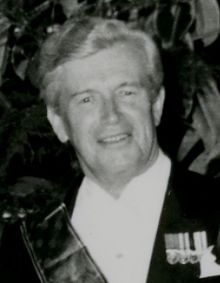Brian Talboys
Sir Brian Edward Talboys , AC , CH , KCB (born June 7, 1921 in Wanganui , † June 3, 2012 in Invercargill ) was a New Zealand politician .
Career
After attending school, he first studied at the University of Manitoba and, on his return to New Zealand, at the Victoria University of Wellington , from which he graduated with a Bachelor of Arts (BA). He then worked in the private sector in a freight forwarding company before he was assistant to the editor of a newspaper for farmers . During the Second World War he did his military service in the Royal New Zealand Air Force and worked as a farmer in Southland after the war .
He began his political career in 1957 as a candidate for the New Zealand National Party (NP) with the first election as a member of the New Zealand House of Representatives , in which he represented the constituency of Wallace until he left politics in 1981 .
In 1961 there was a conscience vote in parliament on the question of the abolition of the death penalty in New Zealand . Ten MPs from National voted together with the New Zealand Labor Party (LP), resulting in a majority of 11 votes against the death penalty with 41 to 30 votes. Those ten MPs, along with Talboys, were Ernest Aderman , Gordon Grieve , Ralph Hanan , Duncan MacIntyre , Robert Muldoon , Herbert Pickering , Logan Sloane , Esme Tombleson, and Herbert John Walker . This abolished the death penalty for murder, but remained in force for treason and related crimes.
The Prime Minister Keith Holyoake appointed him in 1962 to the Minister of Agriculture (Minister of Agriculture) in the Cabinet. In 1964 he was also Minister of Science and in 1969, after the resignation of the Minister of Agriculture, he was also Minister of Education. From February to the election defeat of the NP in December 1972, he was also Minister of Trade and Industry in the government of Prime Minister Jack Marshall . In 1974 he was elected deputy chairman of the NP.
After the renewed election victory of the NP, Prime Minister Robert Muldoon appointed him Deputy Prime Minister and Foreign Minister in his cabinet on December 12, 1975 . He was also Minister of Overseas Trade and Minister of National Development.
1980 came the so-called "Colonel's Coup", in which Talboys should become the new chairman of the NP out of dissatisfaction with the work of Muldoon. Supporters of this failed transfer of power included Attorney General and Attorney General Jim McLay , Secretary of Labor Jim Bolger , Deputy Treasury Secretary Derek Quigley, and Secretary of Health George Gair . Talboys himself was reluctant to replace the party chairman. After Muldoon's fall failed, he was replaced in 1980 as vice-premier by Duncan MacIntyre .
After six years of service, he resigned on December 11, 1981 and was replaced as Secretary of State by the previous Minister of Tourism, Warren Cooper .
After leaving politics, he worked in the private sector.
For his services he was beaten Knight Commander of the Order of the Bath in June 1991 and therefore had the suffix "Sir". He has also been a member of the Order of the Companions of Honor since 1981 .
literature
- Brian E. Talboys , in: Internationales Biographisches Archiv 38/1983 of September 12, 1983, in the Munzinger archive ( beginning of the article freely available)
Web links
Individual evidence
- ↑ Former Deputy PM Sir Brian Talboys dies
- ↑ Former Deputy PM Sir Brian Talboys dies on nzherald.co.nz from June 4, 2012 (English)
- ^ A history of capital punishment in NZ . TVNZ. December 17, 2008. Retrieved February 10, 2009.
| personal data | |
|---|---|
| SURNAME | Talboys, Brian |
| ALTERNATIVE NAMES | Talboys, Brian Edward (full name) |
| BRIEF DESCRIPTION | New Zealand politician |
| DATE OF BIRTH | June 7, 1921 |
| PLACE OF BIRTH | Wanganui |
| DATE OF DEATH | June 3, 2012 |
| Place of death | Invercargill |
